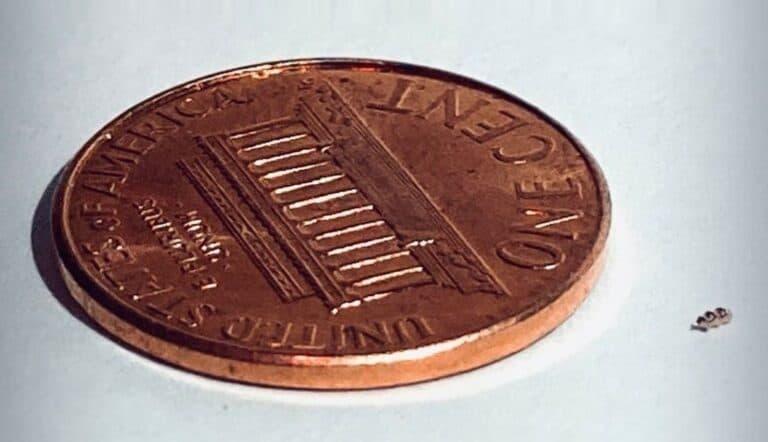A Bionaut robot compared to a penny. Photo by Bionaut Labs
Bionaut Labs CEO says in the future illnesses that now seem incurable will be treated by medication delivered straight to the affected organ.
Robotics entrepreneurs Michael Shpigelmacher, Aviad Maizels and Alex Shpunt were not looking for their big break in the high-tech world when they cofounded Bionaut Labs in 2017.
The three, in fact, are among the most successful Israeli tech entrepreneurs. They’d cofounded PrimeSense in the early 2000s, which developed iPhone’s FaceID facial recognition and was later sold to Apple for $360 million.
Having an impact
“We wanted to create something that would have an even bigger impact on the world,” Shpigelmacher, who serves as the company’s CEO, tells ISRAEL21c. “PrimeSense was great, but saving human lives is something different.”
The Israeli company, now headquartered in Los Angeles, is developing micro-robots called Bionauts.
The robots can be inserted into the cerebrospinal fluid from the spine — or from behind the skull — and precision guided to organs that would otherwise be difficult or impossible to reach.
Shpigelmacher says that the death of his mother and mother-in-law from cancer is what spurred him on to start a company that would help fight serious, and sometimes incurable, illnesses.
“Plus, all three of us are workaholics anyway,” he laughs, referring to Maizels, who serves as Bionaut Labs’ executive chairman, and Shpunt, the company’s chief science officer.
Shpigelmacher was already acquainted with the world of medical tech. After PrimeSense, he had spent several years working with medical equipment manufacturer Mackenzie Medical Group in the United States, where he still resides.
“One of the main takeaways from my time at Mackenzie was that the medical industry in general is a bit rotten,” he says.
“The time for development of new technologies is long. This means the time for investors to get their returns is also long. What’s the outcome? The investors don’t invest, leaving the gaps to be filled by government and academia.”
Shpigelmacher explains that as a result, lifesaving medical technology takes decades to reach the market — if at all.
“If that same technology had another couple of millions in investment, it would have reached the market within five years instead of 10 or 20,” he explains. “Thousands of patients could have been saved.”
Shpigelmacher and his cofounders sped up the process by initially investing their own money. “Only after it had demonstrated promise did we appeal to high-tech investors, who knew us from PrimeSense days and trusted us.”
To date, the company has raised over $63 million and employs 25 people.
Delivery is 80% of the problem
“I realized while still at Mackenzie the vision for what would eventually become Bionaut Labs,” Shpigelmacher says.
He was part of a team working with a pharmaceutical company that wanted to reformulate one of its existing drugs to apply for a new patent and increase its market value. That’s when Shpigelmacher noticed that drugs, which are supposed to target specific parts of the body, infiltrate the entire circulatory system.
“Pharmaceutical companies invest a lot of money into developing new drugs, but most of them fail during trials because of the way the drug is delivered. Eighty percent of the problem in drugs not working is the delivery,” he explains.
“The drug could be effective if it were to be delivered straight to the organ, but when you overwhelm the entire bloodstream with it, you don’t get the desired effect. You also have to worry about side effects because the whole body is affected.”
Bionaut Labs’ first goal is to reach the brain. “The brain is unique because it is inaccessible to medication delivered through the bloodstream,” he explains. “The blood vessels in the brain are lined with a unique property, called the blood-brain barrier, which prevents medication from getting through.”
He adds that the brain is also very sensitive — compared to other body parts — to surgical interventions. As a result, many devastating diseases are considered incurable.
“The illnesses our development would be most useful for are brain cancer, stroke, epilepsy, Parkinson’s and maybe Alzheimer’s.”
The Bionaut way
Shpigelmacher says Bionaut Labs is a year away from clinical trials that will test Bionauts on a brain affected by Dandy-Walker syndrome — a condition where the cerebellum does not develop normally. The tiny robots will be utilized as a surgical tool, not carrying any medication, to prove that they can do the task they were sent out to perform.
“We’ll draw conclusions from that experiment and get back to clinical trials in 2025 to test it out on a brain affected by glioblastoma [a form of an aggressive brain tumor]. In this case, we will be adding medication.”
He says if the glioblastoma trials are successful, the US Food and Drug Administration might authorize the use of Bionauts as soon as 2027 or 2028.
“This will change the way in which drugs are designed because now you don’t have to worry about the blood-brain barrier, for example.”
Shpigelmacher’s vision for the company, however, is much broader. He hopes one day to have Bionauts deliver drugs to any part of the body.
“Tumors of 30% of patients whose cancer has metastasized to the liver are unresectable due to the liver’s unique anatomy. But if you could insert something tiny there to serve as a surgical tool, you could operate on the organ,” he says.
“We’re starting with the brain, but in the future the Bionaut way will take over the market of medical intervention.”
For more information: bionautlabs.com/
